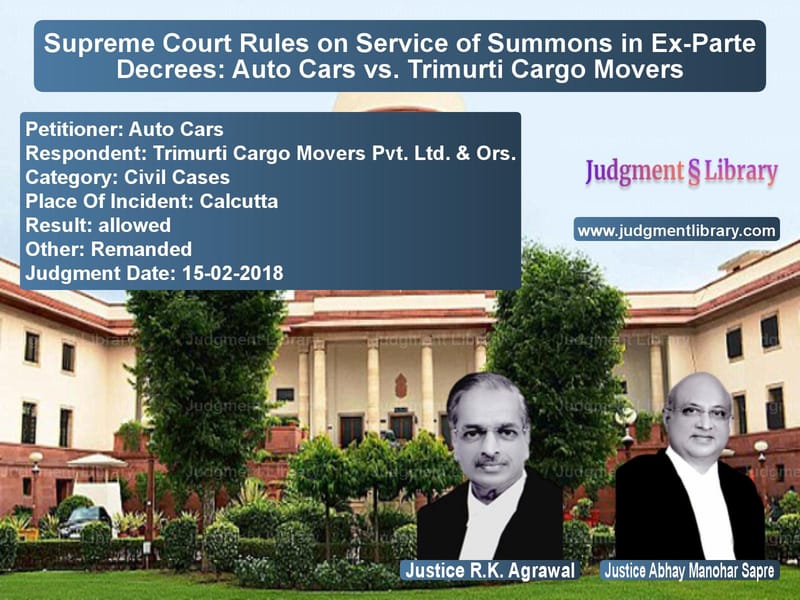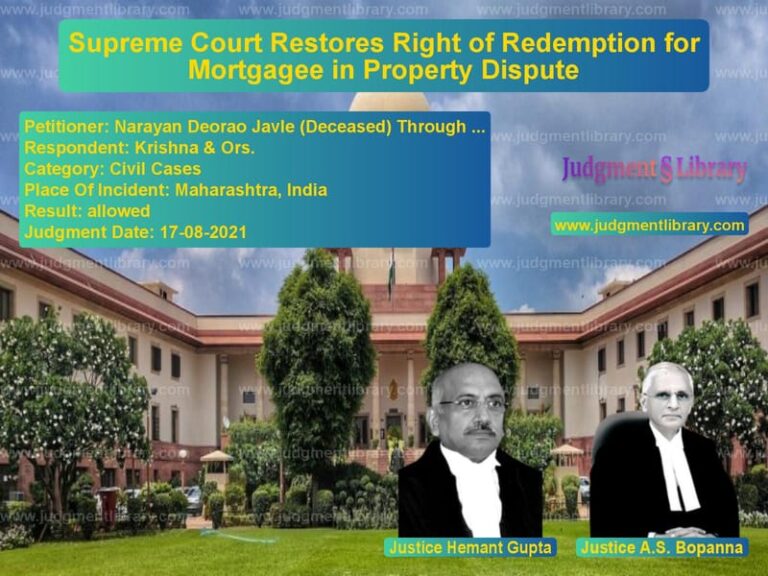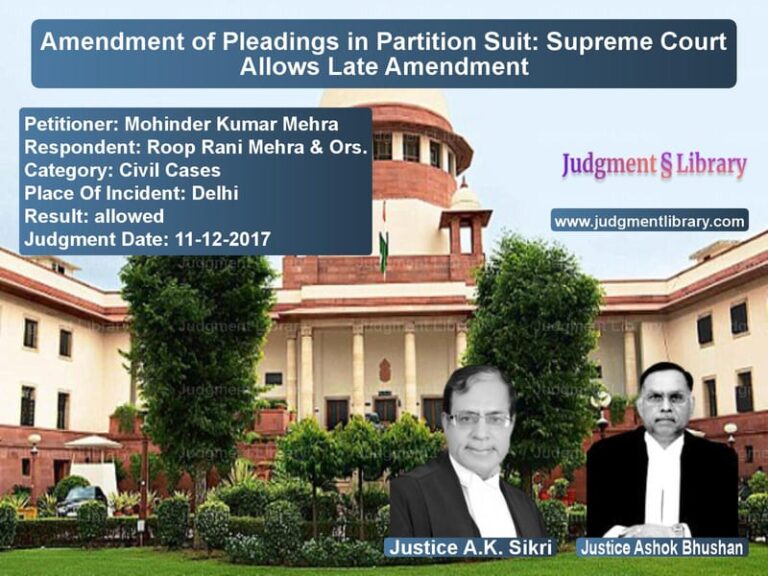Supreme Court Rules on Service of Summons in Ex-Parte Decrees: Auto Cars vs. Trimurti Cargo Movers
The Supreme Court of India, in its judgment in Auto Cars vs. Trimurti Cargo Movers Pvt. Ltd. & Ors., addressed a significant issue related to the service of summons in civil litigation and the setting aside of an ex-parte decree. The Court clarified the essential procedural requirements under the Code of Civil Procedure, 1908 (CPC), and reinforced the principle that a fair trial requires proper notice and opportunity to be heard.
Background of the Case
The case arose from a commercial dispute between Auto Cars and Trimurti Cargo Movers. The plaintiff, Trimurti Cargo Movers, filed a civil suit before the Calcutta High Court in C.S. No. 15 of 2014 for the recovery of Rs. 1,43,18,537. The suit was based on commercial dealings involving the supply of goods and services.
Despite the summons being issued, Auto Cars did not appear in court, and an ex-parte decree was passed on February 9, 2015. Upon discovering the decree, Auto Cars filed an application under Order IX Rule 13 of the CPC to set aside the ex-parte decree, arguing that they had not been properly served with the summons.
Legal Issues
- Whether the summons was duly served as per the requirements of the CPC.
- Whether the service by publication in newspapers was a valid mode of service in this case.
- Whether the ex-parte decree should be set aside under Order IX Rule 13 of the CPC.
Petitioner’s (Auto Cars) Arguments
- The summons was not properly served, as it was published in newspapers that did not have circulation in their place of business.
- They had no knowledge of the suit and were denied a fair opportunity to defend themselves.
- The failure to mention a specific date, time, and venue in the summons violated the procedural requirements of the CPC.
Respondent’s (Trimurti Cargo Movers) Arguments
- The summons was published in the Times of India (Pune Edition) and Dainik Bhaskar (Aurangabad Edition), which satisfied the requirements of service by publication.
- The defendant failed to appear despite the publication, and the court had no choice but to proceed ex-parte.
- The ex-parte decree was passed after considering all evidence and should not be disturbed.
Supreme Court’s Observations
The Supreme Court, comprising Justice R.K. Agrawal and Justice Abhay Manohar Sapre, made the following key observations:
1. Importance of Proper Service of Summons
The Court emphasized that service of summons is a fundamental requirement to ensure a fair trial. The judgment stated:
“The essence of a fair trial is that the defendant must be given adequate notice and a reasonable opportunity to defend.”
2. Deficiency in Service by Publication
The Court found that the summons published in newspapers failed to specify a particular date and time for appearance. It observed:
“The publication must clearly mention the exact date, time, and venue of the hearing to allow the defendant to participate.”
3. Setting Aside an Ex-Parte Decree
The Court ruled that since the service of summons was defective, the ex-parte decree was liable to be set aside under Order IX Rule 13 of the CPC. It stated:
“When the defendant demonstrates that summons were not duly served, they are entitled to have the ex-parte decree set aside.”
Final Judgment
The Supreme Court ruled in favor of Auto Cars and set aside the ex-parte decree. The key directives included:
- The suit was restored for hearing on merits.
- The defendants were granted the opportunity to file their written statements.
- The trial court was directed to expedite the hearing and dispose of the case within one year.
- The deposit of Rs. 47.50 lakhs made by the appellant during the appeal was subject to the final outcome of the trial.
Impact of the Judgment
The Supreme Court’s ruling reinforced key principles of procedural fairness, particularly:
- Proper service of summons is essential for a valid trial.
- Service by publication must clearly specify the hearing details.
- Ex-parte decrees can be set aside if summons were not duly served.
- Defendants must be given a fair chance to present their case.
Conclusion
The Supreme Court’s ruling in Auto Cars vs. Trimurti Cargo Movers is a landmark decision in civil procedure. It highlights the necessity of ensuring that defendants receive proper notice before an ex-parte decree is passed. This judgment upholds the principles of fairness and due process in civil litigation.
Petitioner Name: Auto CarsRespondent Name: Trimurti Cargo Movers Pvt. Ltd. & Ors.Judgment By: Justice R.K. Agrawal, Justice Abhay Manohar SapreJudgment Date: 15-02-2018
Don’t miss out on the full details! Download the complete judgment in PDF format below and gain valuable insights instantly!
Download Judgment: Auto Cars vs Trimurti Cargo Mover Supreme Court of India Judgment Dated 15-02-2018.pdf
Direct Downlaod Judgment: Direct downlaod this Judgment
See all petitions in Contract Disputes
See all petitions in Damages and Compensation
See all petitions in Legal Malpractice
See all petitions in Judgment by R K Agrawal
See all petitions in Judgment by Abhay Manohar Sapre
See all petitions in allowed
See all petitions in Remanded
See all petitions in supreme court of India judgments February 2018
See all petitions in 2018 judgments
See all posts in Civil Cases Category
See all allowed petitions in Civil Cases Category
See all Dismissed petitions in Civil Cases Category
See all partially allowed petitions in Civil Cases Category







